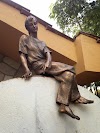The flight to Maseru takes about 45 minutes from Johannesburg. There were only 8 passengers on the plane. Someone said it was because of the time (3 pm), another one because of the price (indeed) and another one pointed out that it is “bumpy” (indeed again).
Coming out of the airport no one was waiting for me as we arrived
early. That gave me a chance to talk with a Salesian Sister from
Mexico working in the country who was waiting for a couple of volunteers
that came in the same flight and ask… “what's the spirit in
the country these days?”.
In the meantime Fr Richard Menatsi (IMBISA) arrived and took me to the Mazenod centre in
Maseru where we would be staying. He also brief me on the meetings they had (or could not have)
these days.
These were short and quick updates. The best one came in the evening when, during supper, I happen to meet someone who had just been working on
“voting education” in the country. A member of the Catholic
Commission of Justice and Peace (CCJP) he had been out of Maseru for
the last six weeks as part of the team.
I understand that, following the Maseru agreement last year, it was
requested that voter education was done in the country in preparation
for the February (2015) elections. The Independent Electoral
Commission of Lesotho partnered with local NGOs in order to show
transparency and avoid being associated with any political party.
The CCJP was one of these organisations. The goal was to build capacity and effective participation
of the people.
I must say I enjoyed every minute of the sharing. Through house to
house visits, community gatherings, music events and connecting with other
stakeholders (local councils, chiefs, government officials) they
raised awareness of the coming elections which are being held two
years' before time as a result of the crisis experienced last year.
It was interesting to see how they adapted to every local situation:
in some cases they would have to meet the people after work, in others they
asked for a 10 minute slot at a community meeting. They addressed
pensioners on “pension day” and they invited a famous musician to
sing at a popular spot. After a couple of songs people would be asked what they knew about the coming elections…
Debates were done at schools:
“Elections, the right to vote is the centre of a
democratic society”. Those who
supported the idea and those who challenged it. These ones probably
reflected what is in the hearts and minds of some or many. “Why
do we need them? How does this change or improve our lives? What
progress bring to our country? Isn't elections linked to
corruption?”.
Things were not always easy. They needed to make clear they were not
representing any specific political party (as parties are doing their
own campaign going door to door too), they had to deal – as the
young people had indicated – with those who felt disappointed with
the political situation and would just not attend any gathering or
would not listen to them.
“Know
your candidate”
was another important initiative. They organised meetings
between candidates of the seven strongest parties and local
communities so that each one could present in 10 minutes their platform after which people could ask questions (in some cases seriously challenging what
they had presented).
I was particularly grateful to God for such an unexpected gift just after
a few hours of being in the Kingdom of Lesotho.




